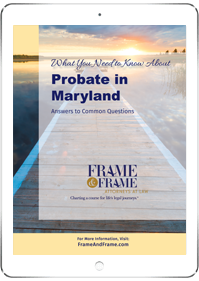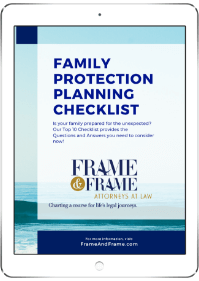Maryland Probate Attorneys Help Families During Difficult Times
Serving Annapolis, Pasadena, Frederick, and Stevensville
There is never a good time to talk about death. But, after a loved one dies, there are many emotional, financial, and legal needs that must be considered. At Frame & Frame, our Maryland probate attorneys have been helping families with these difficult situations for over 70 years. We provide legal guidance, often to several generations of the same family, for thoughtful planning and during times of crises. We are proud to serve as your family’s lawyer and trusted advisor. In fact, Tara Frame was recognized by the SBA as the Maryland Attorney Advocate of the Year. In addition, our Free Guide to Probate in Maryland provides an overview of the factors that must be handled as part of the probate process in Maryland, along with resources and materials to assist you.
What is Probate?
When an individual dies in Maryland, unless they have a trust, their assets first have to pass through probate before they can be transferred to beneficiaries. Probate is the legal process of validating a person’s will and making distribution pursuant to the terms of the will. During probate, the Personal Representative of the estate (or their Probate attorney) is tasked with locating assets, paying debts and taxes, and, lastly, distributing assets to beneficiaries. Probate can be a time intensive and expensive process. It can take anywhere from six months up to several years, depending on the assets involved. A Maryland probate attorney assists with the settlement of creditor claims and the disbursement of assets. This process can alleviate the family member(s) or Executor from performing these complex and time-consuming duties.
How Complicated is the Probate Process?
Without proper planning, probate may be required to transfer a deceased person’s assets to the beneficiaries. Individuals who have a trust may be able to avoid the probate process. There are estates of all sizes that can benefit from legal guidance with probate. A regular estate is valued at $50,000 or more ($100,000 or more if there is a surviving spouse). The complexity of the estate administration process depends on:
- Did the deceased person leave a Will and who is the Executor?
- Are there creditor claims?
- Do any tax elections need to be made?
- Were any trusts created in the Will?
Dying without a will, or being part of a blended family, can lead to unique challenges or surprises, when it comes to the probate process. A probate attorney can be immensely helpful in resolving these family challenges and proceeding in a logical and legal manner that allows your family to move forward in a timely manner, with the closure they deserve.
Common Issues with Probate
When you have a will and the loved one owned assets of any kind solely in his or her name, probate is required in order to transfer the assets. Moreover, probate is required whether there is a will or not. Common problems that families run into by not starting the probate process, in a timely manner, may include the following:
- Missing tax filing deadlines and incurring fees and penalties;
- Creditors have more time to make claims against the estate;
- Assets can be turned over to the Maryland unclaimed property division instead of being distributed to beneficiaries; and
- There may be harsh penalties for the executor themselves.
These issues can easily be avoided through effective estate planning or by ensuring that the estate process is properly handled in a timely manner, with the guidance of an experienced Maryland probate attorney to help the Executor navigate this process with minimal stress and expenses. Learn more about the biggest mistakes to avoid when handling probate issues here.
Do I Need Probate If I Have a Copy of the Will?
The outcome of probate, that is, the inheritance and to whom it goes, depends upon the legal documents put into place by the deceased person before death. If there was a will, the probate court first decides its validity and names an executor. Your loved one’s assets may be able to pass to the heirs by beneficiary designations on life insurance policies and retirement plans. Again, a probate attorney can be immensely helpful during this process and often provides assistance with:
- Assist Executors and Trustees
- Order and Distribute Death Certificates to Creditors
- Open the Estate & Obtain Letters of Administration
- Deal with Creditors, Employees and Others
- Arrange for an Appraisal and Sale of Property
- Arrange for Donation/Sale of Household Items
- Obtain and File Probate Pleadings and Documentation
- Defend Will Contests
- Assist with Estate Tax Returns
Which Assets Must Pass Through Probate?
Maryland has specific guidelines to determine which assets must go through probate and which assets can be distributed outside of probate. Your Maryland probate attorney will help you evaluate these options which may include:
- Property assets like a family home or other real estate,
- Retirement accounts & 401ks,
- Family
- Life insurance policies, annuities, or certificates of deposit,
- Funds in bank accounts and brokerage accounts.
What are non-probate assets?
Property outside of probate include assets like a family home that is owned as Joint Tenants because the surviving joint tenant becomes the owner of the entire asset. Another example is Tenancy by the Entirety where assets are owned by a married couple. Beneficiary Designations on assets is yet another example. These might include retirement accounts, life insurance policies, annuities, or certificates of deposit. These assets pass by operation of law to the beneficiary named by the owner prior to death. Finally, Payable (or Transfer) on Death Accounts (POD or TOD accounts) also do not pass through probate. Funds in bank accounts and brokerage accounts can also have beneficiary designations.
What is the difference between a small estate and a regular estate?
A small estate is an estate that is valued at $50,000 or less, unless the spouse is the sole heir, in which case, it would be an estate valued at $100,000 or less. A regular estate is an estate that is valued at $50,000 or more.
What are the exemptions from inheritance tax?
One exemption of inheritance tax is property that passes from a decedent to a grandparent, parent, spouse, child, spouse of a child, stepparent, stepchild, brother, sister, or a corporation if all stockholders consist of persons previously described herein, known as the lineal descendants. Another exemption is life insurance not payable to the estate of the insured. Other exemptions include grave maintenance passing under a Will, property passing to a non-profit tax exempt organization, property administered under a small estate proceeding, some property passing to any one person that does not exceed a value of $1,000, personal property of a non-resident of Maryland, income accrued on probate assets after the death of a decedent, and specific property that passes from a decedent to his/her domestic partner. The foregoing is merely a general statement. For specific details, contact our experienced Maryland probate attorneys today.
Frequently Asked Questions About Probate in Maryland
You will likely have many questions. View our entire library of FAQs about probate in Maryland here or visit our YouTube channel. These additional articles may be helpful as well.
- Biggest Mistakes to Avoid When Acting as Executor
- Avoiding Probate Problems
- Executor Duties
- Probate For Unmarried Couples
- Real Estate Issues
- Selling the Family Home in Maryland – The Step Up in Basis Rule
- Taxes At Death
Our Maryland Probate Attorneys Help People Through the Probate Process
The outcome of probate, that is, the inheritance and to whom it goes, depends upon the legal documents put into place by the deceased person before death. If there was a will, the probate court first decides its validity and names an executor. The settlement of creditor claims and helping families navigate the probate process provides comfort to survivors experiencing the grieving process. The deceased’s assets may pass to the heirs by beneficiary designations on life insurance policies and retirement plans. If the designations are to people who have already passed on, those assets may have to go through the probate process and distributions must be approved by the court.
What do I do now? What are the next steps? The death of a loved one can be overwhelming. We can guide you through every step of the probate process. Some tasks we typically perform in the probate process include the following:
- Assist Executors and Trustees
- Order and Distribute Death Certificates to Creditors
- Open the Estate and Obtain Letters of Administration
- Deal with Creditors, Employees and Others
- Organize an Appraisal and Sale of Property
- Arrange for Donation or Sale of Household Furnishings
- Obtain and File Probate Documentation
- File Inventories and Administration Accounts
- Defend Will Contests
- Assist with Estate Tax Returns
For legal guidance, contact the Probate Attorneys at Frame & Frame to assist you with the probate process. We have been providing sound legal guidance to families in our community for over 70 years.
DOWNLOAD YOUR FREE GUIDE TO PROBATE

Download your Free Guide to Probate to learn what to do when a loved one dies, the checklist of information you need to gather, and the important tasks that must be accomplished.
Contact Our Experienced Maryland Probate Attorneys Today
Contact our reliable Maryland probate attorneys to help with your situation, call us today or use our contact form.





